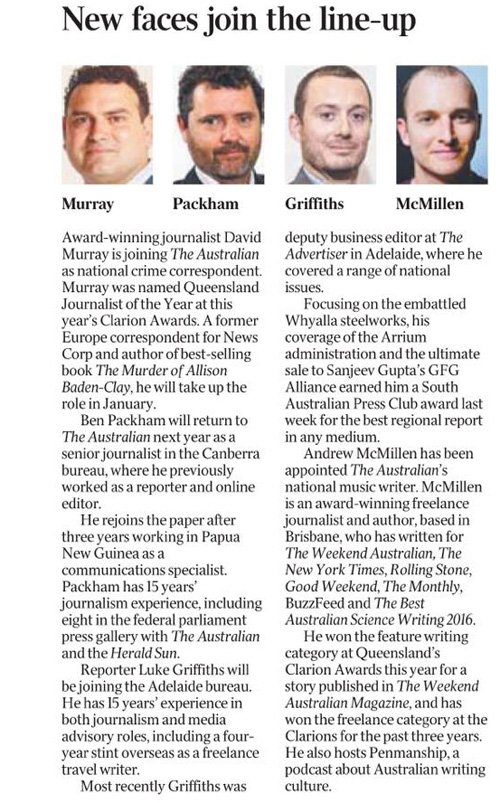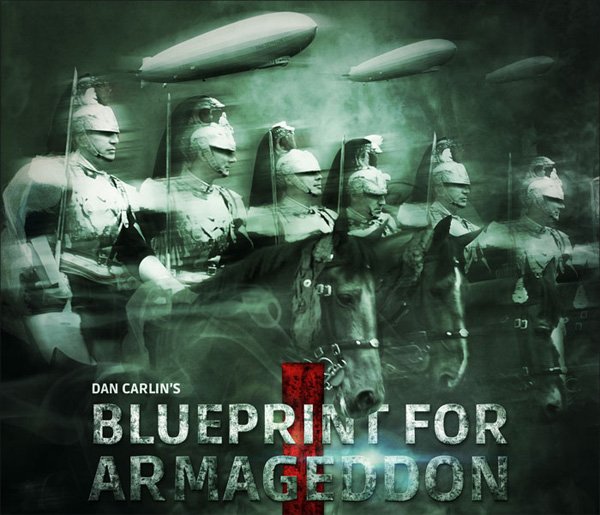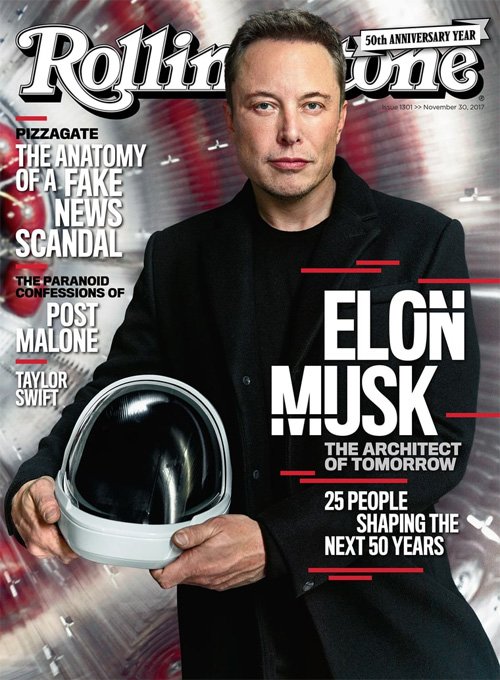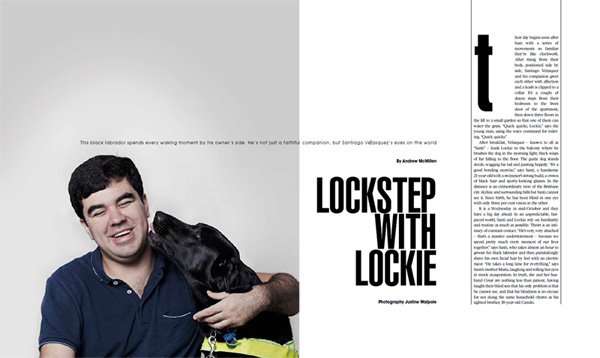Thursday, 30 November 2017
Welcome to Dispatches, a weekly summary of my writing, listening and reading habits.Some news: I have been appointed as national music writer at The Australian, as announced in the newspaper on Saturday:

After 8+ years of freelancing, this will be my first salaried journalism job. I'm honoured and thrilled by the opportunity, and I hope I can do justice to the wonderful work of Iain Shedden, who excelled in this role for nearly 20 years.
I start in January, and I'm on leave in December, though I intend to send another newsletter or two during that time.
What will my new job mean for Dispatches in the new year? Right now, I can't say, as I don't know yet what my weekly workload will look like. I can say that I greatly enjoy preparing this newsletter each week, and hearing from my readers.
So I hope that I can continue this venture in some form, though perhaps on a less regular basis. We shall see.
Words:
I had a story published in The Weekend Australian Magazine on Saturday. Excerpt below.
Lockstep With Lockie (2,700 words / 13 minutes)To read the full story, visit The Australian. Above photo credit: Justine Walpole.
This black labrador spends every waking moment by his owner's side. He's not just a faithful companion, but Santiago Velasquez's eyes on the world.
Their day begins soon after 6am with a series of movements so familiar they're like clockwork. After rising from their beds, positioned side-by-side, Santiago Velasquez and his companion greet each other with affection and a leash is clipped to a collar. It's a couple of dozen steps from their bedroom to the front door of the apartment, then down three floors in the lift to a small garden so that one of them can water the grass. "Quick quicks, Lockie," says the young man, using the voice command for toileting. "Quick quicks."
After breakfast, Velasquez – known to all as "Santi" – leads Lockie to the balcony where he brushes the dog in the morning light, black wisps of fur falling to the floor. The guide dog stands docile, wagging his tail and panting happily. "It's a good bonding exercise," says Santi, a handsome 21-year-old with a swimmer's strong build, a crown of black hair and sporty-looking glasses. In the distance is an extraordinary view of the Brisbane city skyline and surrounding hills but Santi cannot see it. Since birth, he has been blind in one eye with only three per cent vision in the other.
It is a Wednesday in mid-October and they have a big day ahead. In an unpredictable, fast-paced world, Santi and Lockie rely on familiarity and routine as much as possible. Theirs is an intimacy of constant contact. "He's very, very attached – that's a massive understatement – because we spend pretty much every moment of our lives together," says Santi, who takes almost an hour to groom his black labrador and then painstakingly shave his own facial hair by feel with an electric razor. "He takes a long time for everything," says Santi's mother Maria, laughing and rolling her eyes in mock exasperation. In truth, she and her husband Cesar are nothing less than patient, having taught their blind son that his only problem is that he cannot see, and that his blindness is no excuse for not doing the same household chores as his sighted brother, 18-year-old Camilo.
Downstairs at 9am, Santi reattaches the leash and repeats his voice command, while Lockie walks in circles and sniffs the lawn. "Quick quicks, buddy," he says, and he means it: they have a bus to catch. Santi slips a fluorescent yellow harness over the dog's head. With this action, Lockie has been trained to recognise that he is now in work mode, and his focus narrows to the singular task of guiding Santi from home to university – and, much later, back again. The dog is now six years old but has been in training since he was a puppy to fulfil this role. Santi never knew him as a puppy: Lockie was three when they first met on a rainy day at the Guide Dogs Queensland head office. Since January 9, 2015 – a date seared into Santi's memory – they have scarcely spent an hour apart.
How I found this story: I became interested in the relationship between people with low vision and their guide dogs earlier this year, when I reported a story for The Weekend Australian Review about audio description services for blind theatregoers (Sight Unseen). I had the idea of writing about a day in the life of a guide dog, so I approached Guide Dogs Queensland to see if they'd be open to participating, by suggesting a suitable candidate for me to follow.
GDQ put me in touch with Santi and Lockie, and I'm pleased to say that it was a perfect match, as they are both exactly the kind of energetic, outgoing combination I was looking for. I spent a 14-hour day with the pair of them in October, and this was one of my favourite stories to report because it included some completely unexpected events that happened to take place on that day. I love that sort of randomness: I was lucky to be in the right place at the right time, and I was privileged to observe such an intimate relationship up close.
Sounds:

Blueprint For Armageddon on Hardcore History (six episodes, ~23 hours). I have been aware of this podcast for the five or so years that I've been an avid consumer of the medium, but I had chosen to avoid it as I was put off by the extreme duration of each series. All I can say is that I'm an idiot to have deprived myself of Dan Carlin's Hardcore History for so long, and this particular six-part series is an absorbing and brilliantly told history of the events surrounding World War I. Carlin is an expert guide, and quotes extensively from historical accounts from many participants, including the Germans, British, Russians and French, as well as several of the smaller powers who were involved in the conflict. I highly recommend Blueprint For Armageddon, which is freely available via your podcatcher of choice, and I'm keen to dig into another series soon – perhaps Wrath of the Khans, which is behind a paywall. But considering the extraordinary amount of work that Carlin and his team put into each of these episodes, it's absolutely worth paying for.
Jodi Kantor on Longform (55 minutes). A fantastic conversation with one of the investigative reporters who broke the Harvey Weinstein story in recent months. So much wisdom here.The planet hadn't seen a major war between all the Great Powers since the downfall of Napoleon at Waterloo in 1815. But 99 years later the dam breaks and a Pandora's Box of violence engulfs the planet.
Jodi Kantor is a New York Times investigative reporter and the author of The Obamas. On October 5th, she (with Megan Twohey) published an article detailing decades of sexual harassment payoffs by Harvey Weinstein, and she has covered the story extensively since. "Being a reporter really robs you of self-consciousness and shyness. You realize that it's this great gift of being able to ask crazy questions, either really personal or very probing or especially with a powerful – to walk up to Harvey Weinstein, essentially and say, 'What have you been doing to women all these years, and for how long? All of these other people may be afraid to confront you about it, but we are not.' That is our job."
Tim Steward on Gimme Empathy (86 minutes). I loved this conversation between host Scott Mercer and Brisbane musician Tim Steward, in part because Mercer happens to play in one of Steward's bands. They have a great connection, and it's cool to hear them learning a bit more about each other. I like how open Steward is about some seemingly tough subjects, such as a recent health scare and the deaths of people close to him.
Scott's bandmate Tim Steward (Screamfeeder, We All Want To) recounts growing up in 1970s punk London and moving to the other side of the world as a teenager, plus health scares and songwriting.
Joe Gorman on Conversations (56 minutes). An excellent and authoritative discussion of the history of Australian soccer, as told by journalist and author Joe Gorman, who I'm proud to call a friend.
At the grassroots level, Australian soccer has more young players than any other sporting code. Paradoxically, Joe Gorman has found that the professional league in Australia is still struggling to find an identity, for reasons which have little to do with the sport. Joe has written a history of our first national football competition, including an early engagement with Asia, the reasons behind crowd violence, and how the game formed a professional league. He also reveals a tale of two men integral to the sport; a visionary journalist, and the nation's leading soccer statistician, who were quietly recording the story over many years. What happened to the early soccer clubs tells a history of Australia that's not really heard anywhere else.
Reads:

The Architect Of Tomorrow by Neil Strauss in Rolling Stone (6,900 words / 34 minutes). Trust Neil Strauss to turn out a gripping, surprising and enlightening profile of Tesla founder Elon Musk, who is one of those figures edging closer and closer to the centre of popular culture. You might think you know a few things about the guy, but you might be wrong, too. Strauss spent nine months reporting this one, and after "watching Musk do everything from strategize Mars landings with his rocket-engineering team to plan the next breakthroughs with his artificial-intelligence experts, I learned he is someone far, far different from what his myth and reputation suggest." Brilliant reporting and writing.
My Bloody Valentine's Kevin Shields on the Agony and Ecstasy of 'Loveless' by Kory Grow in Rolling Stone (4,500 words / 23 minutes). Loveless by My Bloody Valentine is one of my favourite albums, so I was predisposed to love every word of this detailed look inside bandleader Kevin Shields' exhaustive, expensive process of remastering Loveless and its predecessor for vinyl release. Shields is one of a kind, and while I'm glad to hear that the band is set to release new music and tour in 2018, it's also troubling to read that he thinks he's damaged his ears so badly that he expects to soon lose much of his auditory range: "My hearing isn't gonna be really good in five years," he says. "It's a downward spiral from now on."It's mid-afternoon on a Friday at SpaceX headquarters in Hawthorne, California, and three of Elon Musk's children are gathered around him – one of his triplets, both of his twins. Musk is wearing a gray T-shirt and sitting in a swivel chair at his desk, which is not in a private office behind a closed door, but in an accessible corner cubicle festooned with outer-space novelty items, photos of his rockets, and mementos from Tesla and his other companies. Most tellingly, there's a framed poster of a shooting star with a caption underneath it that reads, "When you wish upon a falling star, your dreams can come true. Unless it's really a meteor hurtling to the Earth which will destroy all life. Then you're pretty much hosed, no matter what you wish for. Unless it's death by meteorite." To most people, this would be mere dark humor, but in this setting, it's also a reminder of Musk's master plan: to create habitats for humanity on other planets and moons. If we don't send our civilization into another Dark Ages before Musk or one of his dream's inheritors pull it off, then Musk will likely be remembered as one of the most seminal figures of this millennium. Kids on all the terraformed planets of the universe will look forward to Musk Day, when they get the day off to commemorate the birth of the Earthling who single-handedly ushered in the era of space colonization. And that's just one of Musk's ambitions. Others include converting automobiles, households and as much industry as possible from fossil fuels to sustainable energy; implementing a new form of high-speed city-to-city transportation via vacuum tube; relieving traffic congestion with a honeycomb of underground tunnels fitted with electric skates for cars and commuters; creating a mind-computer interface to enhance human health and brainpower; and saving humanity from the future threat of an artificial intelligence that may one day run amok and decide, quite rationally, to eliminate the irrational human species.
Australia Built A Hell For Refugees on Manus. The Shame Will Outlive Us All by Richard Flanagan on Guardian Australia (1,800 words / 9 minutes). This article – a tribute to Iranian journalist and refugee Behrouz Boochani – made me cry, because it is so very true, and so very sad. "In Boochani's writings is a spirit Australia has lost: brave, honest, generous and free," writes Flanagan. "Once he wanted to come here. Now we need him and all that he stands for more than ever."In the past few months, Kevin Shields nearly went bankrupt, as he pursued the seemingly Sisyphean task of making new, completely analog vinyl remasters of My Bloody Valentine's generation-defining albums, 1988's Isn't Anything? and 1991's Loveless. "When we started, I was borrowing money from myself when I should have been paying tax bills," the guitarist and vocalist, 54, tells Rolling Stone. "Instead, I was like, 'No, let's do this. It will only take six months.'" It wound up taking roughly two years. It wasn't the first time he had to borrow money to fund his art. At various points in My Bloody Valentine's three-decade history, he and his bandmates have lived in squats and gone through penniless periods. Even as the band became one of the pioneering "shoegazing" bands, a group of late-Eighties British and Irish outfits whose music was so dreamy that they seemed to be hypnotized by it onstage, staring at their feet, My Bloody Valentine paid their dues. "Everything I have ever done has paid for itself," Shields says with confidence in his voice. "I've never made anything in my life that hasn't made money in the end. I'm not really worried." And, he adds, "A lack of money kind of helps in a very weird way, because we're not fighting over money because there isn't any." Despite the appearance that My Bloody Valentine, whose members also include vocalist-guitarist Bilinda Butcher, bassist Debbie Googe and drummer Colm Ó Cíosóig, seem to have vanished since their last tour ended in 2013, with various members of the band exploring other pursuits, Shields reports the band is in a "healthy state" and has been working on a new, as-yet-untitled album due out by next summer. He's not sure how many songs will make the cut, but he's adamant that the group will be supporting the LP on the road next year.
How Mid-2000s Emo Groomed Underage Girls and Poisoned Teen Boys by Sophie Benjamin on Medium (1,600 words / 8 minutes). A well-written and perceptive article about some of the sexually and emotionally abusive men who came to prominence around a decade ago, as musicians and songwriters in the emo sub-genre, and how some of their bad behaviour was hidden in plain sight. I also liked reading Sophie Benjamin's account of the article's success on Medium, where a week later, "it has managed to get 70,000 reads; 187,000 views and driven more than 100 very generous donations to my PayPal", thereby earning the writer more money (and a direct connection with her readers) than if it had been published elsewhere.So this is what we have come to as a nation. The wretched of the earth, because they were no longer safe where they lived, sought to come here. With a determined cruelty, we kidnapped and imprisoned them in Pacific lagers. These lagers became synonymous with the idea of hellholes because it was important to our government that they be – and be known as – hellholes. On this policy of deterrence, as it was called, which had as its declared purpose to make innocent human beings suffer indefinitely, we spent billions of dollars. To this end we had truck with vile regimes such as Sri Lanka's. And to this end we began forsaking our democratic rights. In the camps the refugees were made to answer to numbers given to them as their new identity. Denied their names they were not even allowed their stories. Every attempt that could be made was made by the Australian government, from the petty to the disturbing, to deny journalists access to the Pacific lager. When it came to imprisoned refugees free speech became a crime: for some years any doctor, nurse or social worker in the camps who publicly reported on the many instances, now well-documented, of rape, murder, suicide and sexual abuse of refugees was liable to two years' imprisonment. And why? Because evil was being done to the innocent, and to that truth there is finally no justification that even the most powerful could make.
The Last Laugh by Stephanie Bunbury in The Sydney Morning Herald Spectrum (2,300 words / 11 minutes). I loved this profile of Barry Humphries, ahead of an upcoming tour where he won't be acting as another character. This made me laugh: "People describe him as an Australian icon. They shout it across the street. "Hey, Barry, you're a f---ing icon! F-U-K-I-N-I-C-O-N. I smile and wave."Around the same time Brand New's Jesse Lacey was singing songs about wishing his ex-girlfriend would die in a plane crash because she had the audacity to do a semester of college abroad, he was coercing underage girls into sending him nudes. When he was singing songs about plying women with alcohol and then fucking them in the carpark while they were blackout drunk, he was masturbating on webcam in front of horrified teenage girls. These things are not unconnected. The fact that those girls felt they couldn't publicly share what happened to them until more than 10 years later, now that they are nearly 30 years old, is no coincidence. The lyrics sung by their heroes and in bands like Brand New, Fall Out Boy, Weezer and New Found Glory set them up as prey for sensitive emo men. In 2003 Jessica Hopper wrote about the rise of commercial emo, and the complete contempt with which the male songwriters operating in this genre viewed women. Her essay, Emo, Where The Girls Aren't, examines the misogyny of emo in a wider context within rock music–a genre that has a long and proud history of outright misogyny and contempt for women. Male emo lyricists, wrote Hopper, depicted women "on a pedestal or on our backs. Muses as best. Cum rags or invisible at worst."
++"I have a little tendency to obesity," says Barry Humphries in a stage murmur. "It's yet to become morbid but, as I discuss it with you, a beautiful biscuit would appeal. Brought in the door with a cup of tea." He gives a resigned sigh, sounding a lot like Highett's favourite returned soldier, Sandy Stone. "But it's very unlikely to happen." Very unlikely, because biscuits are banned from the kitchen as he shapes up for a series of shows next year. "You wouldn't know I was dieting if you saw what I was eating." Is he doing any exercise? "A bit. I walk to the corner. I attribute my longevity to not playing sport of any kind." Barry Humphries is 83. When he does this impending show, which will require him to be on stage alone for a couple of hours every night, he will be 84. No, he doesn't plan to retire. "People who retire die, don't they?" We are sitting in his library, on the first floor of an appealingly muddled but still imposing Georgian townhouse in north London. I have read he owns 35,000 books, although I can't imagine him counting them. They are stacked and strewn everywhere, not just on the shelves. "It's more of a storeroom," Humphries says, vaguely apologetic. A title on the shelf at my elbow jumps out at me: The English Vice. A shelf on the other side of the room holds vintage children's books, bought from dealers to replace the ones his mother gave away one day when he was at school.
Thanks for reading. If you have feedback on Dispatches, I'd love to hear from you: just reply to this email. Please feel free to share this far and wide with fellow journalism, music, podcast and book lovers.
Andrew
--
E: [email protected]
W: http://andrewmcmillen.com/
T: @Andrew_McMillen
If you're reading this as a non-subscriber and you'd like to receive Dispatches in your inbox each week, sign up here. To view the archive of past Dispatches dating back to March 2014, head here.

Congrats on the new role! I hope you can post those articles here as well.
I have been off for most of the last month so I haven't been on Steemit much, I am just reading dispatches properly for the first time. This is a really great read and I hope it continues in some form. Best of luck in the new role too.
Thanks mate!
That was a great piece on Musk. I actually didn't start reading @neilstrauss until after seeing him speak at last year's SteemFest. Once you pick up one of his books, it's tough to put down.
Yeah, he's been a huge influence in my writing career. I met and interviewed him in 2009, and that experience was one of the reasons I decided to continue down the journalism path: http://andrewmcmillen.com/2009/09/06/a-conversation-with-neil-strauss-new-york-times-bestselling-author-2009/
this blog story is absolutely momentum...i gain huge knoledge this blog...
that's a good writting on steemit..
thank's for sharing
I am so glad I bumbled upon you here and wish you continued success in all you do xox